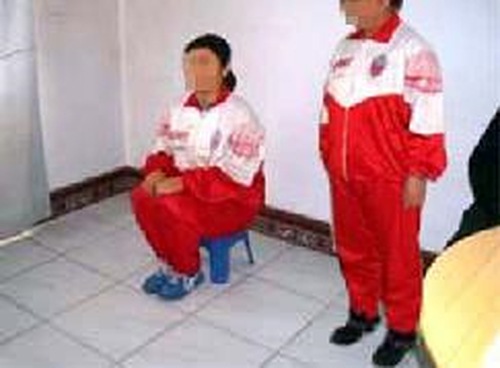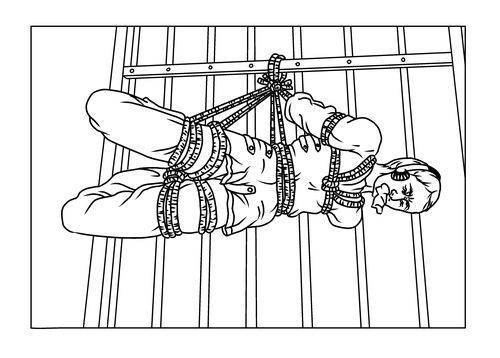A Woman’s Unwavering Efforts to Overturn Wrongful Ten-year Sentence for Her Faith
(Minghui.org) A woman from Honghe Autonomous Region in Yunnan Province spent ten years in prison because she refused to renounce her faith in Falun Dafa (also known as Falun Gong), a spiritual discipline and meditation practice persecuted in China since 1999. She is now seeking to have the prison sentence overturned.
Ms. Liu Yan believes that practicing Falun Dafa does not violate any law and she was not guilty of any wrongdoing. During her ten years in Yunnan Province Second Women’s Prison, from July 2010 to July 2020, Ms. Liu protested peacefully by refusing to follow the guards’ orders, wear the prison uniform, or do intensive labor. She went on a hunger strike when the guards tried to force her to work.
The following is a summary of Ms. Liu’s story, including her ordeals in detention.
Blessings Come with Falun Dafa
Ms. Liu, born on July 15, 1965, worked in the Honghe Autonomous Region Bureau of Water Resources after she graduated from college. She used to suffer from hepatitis, and the cost of the medicines put a heavy financial burden on her family. After she learned the teachings of Falun Dafa in 1996, she never needed medication again.
The teachings of Falun Dafa enabled Ms. Liu to become a considerate and selfless person. She got along well with her family and coworkers. At work, she won the provincial award almost every year because of her superb performance. Ms. Liu said that she was filled with joy because her world view changed and she knew her purpose in life.
Ten Years in Prison for Practicing Falun Dafa
Ms. Liu, her husband, and several other Falun Dafa practitioners were at a park on July 3, 2010 when the police arrested them. The officers ransacked her home and confiscated her laptops, desktop, printers, DVD burner, cellphones, and Falun Dafa books. Later, a judge at a local court sentenced Ms. Liu to ten years in prison.
Tortured in Prison
The guards at Yunnan Province Second Women’s Prison tortured Ms. Liu in an attempt to coerce her into signing a statement to renounce Falun Dafa. They made her sit still on a small stool with 72 sharp nails on the seat for 15 hours a day every day. The flesh on her buttocks was pierced and became infected. The excruciating pain made her heart rate go abnormally high. The prison doctor let her lie down briefly before making her go back on the stool.
 Torture reenactment: Sitting still on a small stool for long hours
Torture reenactment: Sitting still on a small stool for long hours
At night the collaborators [former practitioners who had given up practicing Falun Gong under pressure] would not let Ms. Liu use the restroom. They also restricted her restroom use during the day. Unable to urinate, she suffered elevated uric acid levels in the blood. When the guards gave her medicine, Ms. Liu told them that she’d recover if they would just let her use the restroom when she needed to. The guards ignored her and continued to force her to sit on the small stool, including during mealtimes.
Ms. Liu decided one day that she’d not sit on the stool anymore, despite the warnings from the collaborators. She resisted and wouldn’t sit back down. She walked up to the guard entering the room and said, “From now on I am not sitting on this stool. It’s my right!” Seeing how determined she was, the guard told the collaborators to leave her alone.
Seeking Unconditional Release With Charges Cleared
Firmly believing that she wasn’t supposed to be in prison for her faith, Ms. Liu refused to respond during the roll calls. When the guard on duty called her name, she would not squat down. Instead, she looked the guard in the eye and said, “Release me without charges,” or, “Falun Dafa is good.” Eventually the guards skipped her name during roll calls.
Ms. Liu’s peaceful non-cooperation included not doing the forced labor the guards assigned her. The guards told several prisoners to drag her to the workshop and try to force her to work. In response, Ms. Liu went on a hunger strike. A few days later the guards put her in a straitjacket and inserted a tube through her nose into her stomach to force-feed her.
Because the prisoners purposely dragged Ms. Liu across the ground, her buttocks, legs, and feet were covered in blood, her pants were torn, and she had dirt all over her. Instead of giving her medical treatment, the guards wouldn’t allow her to wash.
 Torture illustration: straitjacket
Torture illustration: straitjacket
When Ms. Liu refused to put on the prison uniform, the guards had the prisoners hold her down and force the uniform on her. They also took away her coat in winter and left the windows open. She wasn’t given any drinking water either. But nothing would make her give in.
One time, a guard had the prisoners replace her clothes with the uniform while she was washing up. She flipped the uniform inside out and put it on so the prison logo was hidden. From then on the guards gave up their attempts to force her to wear the prison uniform.
Because she refused to wear prison uniform, the guards wouldn’t let her call home once a month and denied her family visits.
While some guards actively participated in the persecution, others quietly observed her. Before she was released, a guard told her that they knew she was a good person. “You never swore at and fought with others, and you never used more water than you should. Instead, you helped others.” But because of the top-down persecution policy, they couldn’t do anything to help her.
Thirty-nine Appeal Letters
Ms. Liu wrote appeal letters to the Yunnan Province High Court, but she never received any response until about her 7th or 8th try. On November 29, 2016, a guard asked her to sign the response from the high court that stated that her appeal had been turned down. She refused to sign and in 2017 she began to appeal to China’s Supreme Court and Supreme Procuratorate. She wrote an appeal letter almost once a month, totaling 39 letters by the time she was released on July 3, 2020. The authorities did not respond to any of her letters.
Family Suffers from Persecution
The prison authorities did not let Ms. Liu’s husband visit her, saying that he didn’t have the approval of the local 610 Office. At the local 610 Office, the agents demanded that he sign letters to guarantee that he’d give up his practice of Falun Dafa before they’d issue an approval. He refused to compromise his belief and as a result never got to visit his wife in prison. Ms. Liu’s husband was later given three years in prison with five years of probation for not renouncing his faith.
For ten years, not knowing Ms. Liu’s condition, her parents lived under extreme sorrow and mental distress. They passed away while she was still serving time, and she did not get to see them for the last time.
Due to the persecution of Ms. Liu and her husband, their daughter lived in poverty and had to borrow money to go to college. She was barred from applying for jobs in government or public institutions, which are considered the most stable jobs in China.
Loss of Pension
When Ms. Liu was taken to the prison, she was 45. By the time she was released at 55, her hair had turned gray. She planned to retire, only to learn that her employer had fired her and removed the record of her 20-plus years of service, rendering her unable to apply for her pension.
Continued Efforts to Appeal
After Ms. Liu was released, she went to the Honghe Autonomous Region Intermediate Court, which was the court that issued her ten-year prison sentence, on December 15, 2021 and submitted a motion to revoke her prison sentence and clear her of any crime.
Judge He (phone number: +86-873-3053657) refused to accept her case on the grounds that the Yunnan Province High Court had already rejected her appeal and the decision was final.
Ms. Liu insisted that the intermediate court correct the wrongful sentence. In the end the judge took her motion, but stated that it was only for record keeping. When she went to the Honghe Autonomous Region Procuratorate, the receptionist told her the same thing, that they couldn’t revoke her conviction unless informed to do so by the higher authorities.
Ms. Liu mailed copies of her motion to the Yunnan Province High Court, the Yunnan Province Procuratorate, and the Supreme Court, each of which has yet to respond upon receiving the document on December 20, 2021.